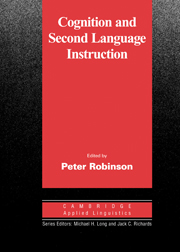Book contents
- Frontmatter
- Contents
- Series editors' preface
- Preface
- SECTION I THEORETICAL ISSUES
- 1 Attention
- 2 Memory for language
- 3 The competition model: the input, the context, and the brain
- 4 Sentence processing
- 5 Automaticity and automatization
- 6 Learnability and second language acquisition theory
- SECTION II COGNITION AND INSTRUCTION
- References
- Index
1 - Attention
Published online by Cambridge University Press: 05 October 2012
- Frontmatter
- Contents
- Series editors' preface
- Preface
- SECTION I THEORETICAL ISSUES
- 1 Attention
- 2 Memory for language
- 3 The competition model: the input, the context, and the brain
- 4 Sentence processing
- 5 Automaticity and automatization
- 6 Learnability and second language acquisition theory
- SECTION II COGNITION AND INSTRUCTION
- References
- Index
Summary
Introduction
The essential claim of this chapter is that the concept of attention is necessary in order to understand virtually every aspect of second language acquisition (SLA), including the development of interlanguages (ILs) over time, variation within IL at particular points in time, the development of L2 influency, the role of individual differences such as motivation, aptitude and learning strategies in L2 learning, and the ways in which interaction, negotiation for meaning, and all forms of instruction contribute to language learning.
The theoretical issues dealt with in this chapter are organized around the basic assumptions, definitions, and metaphors concerning attention in psychology and include the idea of attention as a limited capacity, the notion of selective attention, and the role of attention in action control, access to awareness, and learning. It turns out that, like most psychological concepts initially based on common experience, attention is not a unitary phenomenon, but refers to a variety of mechanisms. These include alertness, orientation, preconscious registration (detection without awareness), selection (detection with awareness within selective attention), facilitation, and inhibition. This does not diminish the centrality of attention, in its several manifestations, for learning. Although recent evidence, discussed towards the end of this chapter, indicates the possibility of some unattended learning, this appears limited in scope and relevance for SLA. There is no doubt that attended learning is far superior, and for all practical purposes, attention is necessary for all aspects of L2 learning.
Information
- Type
- Chapter
- Information
- Cognition and Second Language Instruction , pp. 3 - 32Publisher: Cambridge University PressPrint publication year: 2001
Accessibility standard: Unknown
Why this information is here
This section outlines the accessibility features of this content - including support for screen readers, full keyboard navigation and high-contrast display options. This may not be relevant for you.Accessibility Information
- 984
- Cited by
